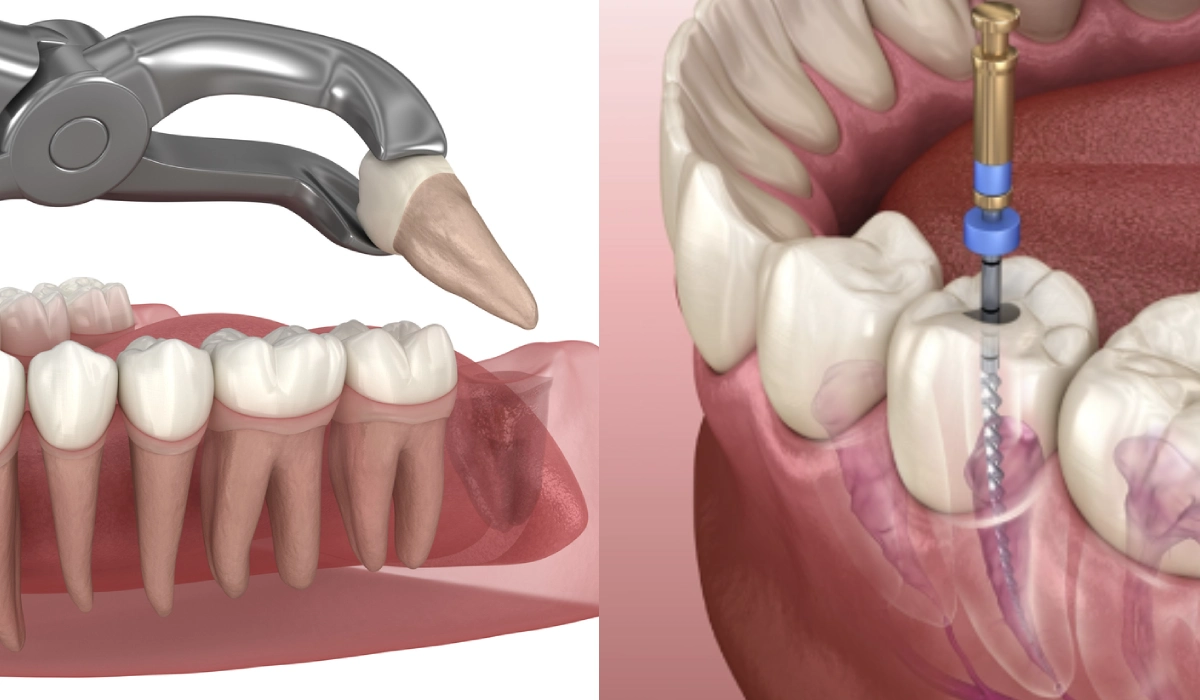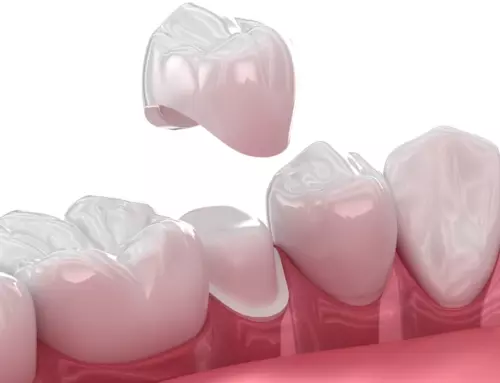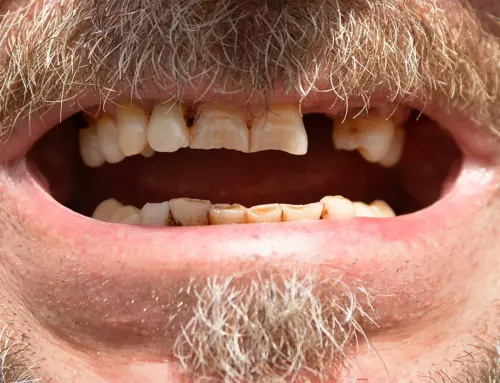Tooth decay is common and painful, and when it reaches the sensitive pulp inside your tooth, it leaves you facing a tough decision: root canal vs tooth extraction. Both have pros and cons, and the debate over the “better” option rages. But the truth is, both serve their purpose, and the right choice depends on your unique situation.
To help you navigate this crucial decision, let’s break down the key differences between root canal vs tooth extraction:
- Root Canal: This procedure aims to save your tooth by removing the infected pulp and filling the empty canals. It’s generally more expensive than an extraction, but it preserves your natural tooth, saving you from future complications and costly replacements.
- Tooth Extraction: This straightforward procedure involves simply removing the entire tooth. It’s often the faster and cheaper option, but it leaves a gap that needs to be filled with an implant, bridge, or denture. This can add up in the long run, both financially and functionally.
Ultimately, the choice between root canal vs tooth extraction is personal. Your dentist will consider the severity of the decay, the condition of your remaining teeth, and your preferences to recommend the best course of action.
But don’t let fear hold you back! Unfortunately, 26% of Americans avoid treating tooth decay due to anxieties surrounding both procedures. The good news? Both root canal and tooth extraction are performed under local anesthesia, making them virtually painless.
Root Canal Vs Tooth Extraction
Root canal vs tooth extraction are dental procedures used to address damaged or problematic teeth. However, they differ significantly in their approach and the outcomes they achieve. Let’s delve into the details of each to help you understand which option might be right for you:
Root Canal
A root canal is a dental intervention crafted to salvage a tooth that is either damaged or infected. During a root canal, the dentist extracts the infected pulp, thoroughly cleans and disinfects the tooth’s interior, and subsequently seals it. This process is typically advised when it is feasible to maintain the tooth’s structure, offering a means to preserve the natural tooth.
Tooth Extraction
Alternatively, tooth extraction entails the total removal of a damaged or problematic tooth. Typically, this choice is contemplated when a tooth is extensively damaged, irreparably infected, or threatens the neighboring teeth and oral health. Despite its apparent simplicity, opting for tooth extraction comes with its own unique set of consequences.
Benefits and Drawbacks of Root Canal vs Tooth Extraction
Root Canal |
|
| Benefits | Drawbacks |
| The root canal preserves your natural tooth by improving chewing, speech, and a natural-looking smile. | Depending on the complexity, a root canal treatment may require multiple visits to the dentist. |
| A root canal eliminates the need for costly replacements like bridges or implants. | Some patients may experience mild discomfort after the procedure. |
| Modern treatments with local anesthesia have made root canal procedures painless. | In rare cases, a root canal may not completely resolve the infection, requiring extraction. |
Tooth Extraction |
|
| Benefits | Drawbacks |
| Tooth extraction is a faster and more straightforward procedure. | A tooth extraction compromises chewing, speech, and facial aesthetics. |
| Generally, a tooth extraction is less expensive than a root canal. | It requires more prolonged healing and post-operative care. |
| Tooth extraction provides immediate relief from pain and discomfort. | Tooth extraction has a small risk of bleeding, infection, or nerve damage. |
Root Canal vs Tooth Extraction — Which One Should You Choose?
The decision between undergoing a root canal or a tooth extraction hinges on various factors, which include:
Severity of Tooth Damage or Infection 
Mild to Moderate Cases
Root canals are often the preferred choice for mild to moderate infections, as they preserve the natural tooth structure.
Severe Damage or Fractures
Extractions become more likely when dealing with severely damaged or fractured teeth, where preserving the tooth is not a viable option.
Overall Health and Medical History
Medical Conditions
Certain medical conditions may make root canals less suitable. Your dentist will evaluate your health and medical history to determine the safest and most effective treatment option.
Cost Considerations
Initial Cost vs Long-Term Investment
While extractions may seem more cost-effective initially, considering the long-term perspective is important. By preserving the natural tooth, root canals can prove to be more cost-effective over time, as they avoid additional tooth replacement procedures.
Personal Preferences
Open Communication
Discuss your concerns, priorities, and preferences with your dentist to ensure that the chosen dental procedure aligns with your comfort level and desired outcome.
Informed Decision-Making
By openly communicating your preferences, you and your dentist can work together to make an informed decision considering the practical aspects of treatment and your comfort.
Preserve Your Dental Health with Delight Dental Smiles in Hollywood, FL
Choose Delight Dental Smiles in Hollywood, FL, and save your natural teeth! Dr. Arianna Rodriguez performs painless root canal procedures to restore your smile’s health and function. We empower you to make informed decisions, explaining all treatment options and recommending the most beneficial approach.
Don’t let a toothache lead to extraction – contact Delight Dental Smiles at (954) 406-6897 or schedule an online appointment today!
FAQs
How can I save my teeth without a root canal?
While pulp capping can be a viable alternative to a root canal, it requires careful assessment. The pulp needs to be healthy and minimally exposed, with no signs of infection. Additionally, the injury to the tooth must be recent. Remember, pulp capping cannot treat a dead tooth.
What happens if you can’t afford a root canal?
There are several ways to potentially reduce the cost of a root canal, such as through dental schools, public clinics, government-subsidized health care plans, or financing options.
Why do many people want to avoid root canal?
Incomplete removal of bacteria during a root canal can pose serious health risks. Even benign oral bacteria can become hazardous once they’ve caused an infection, potentially leading to malaise, inflammation, and even the formation of abscesses in the head or neck.







